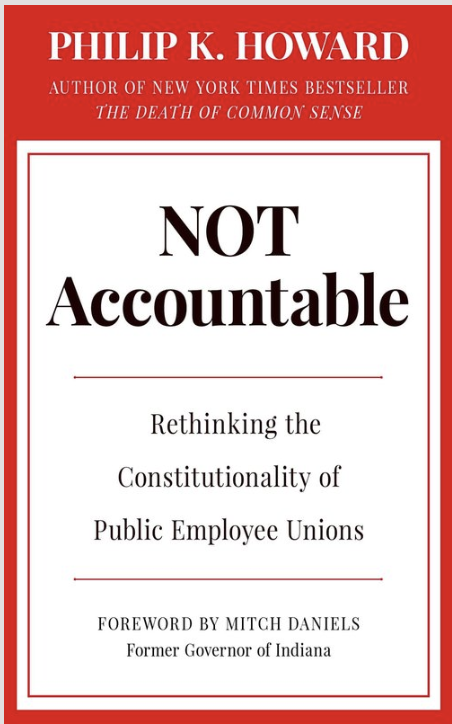Discussing Public Employee Right to Strike with High School Debaters
Yesterday I had the opportunity to discuss public policy ideas with two bright and motivated high school debaters. By email we discussed a recent debate on whether public employees ought to have the right to strike.

For background on public employee unions, I recommended Philip Howard’s, Not Accountable: Rethinking the Constitutionality of Public Employee Unions. Howard is not a conservative or libertarian (as far as I know), but simply wants government to function. He’s written many books critical of current government, without being ideological (Especially The Rule of Nobody and The Death of Common Sense. Website: https://www.philipkhoward.com/ )
Next I offered comments on history: Early labor union advocates believed unions were needed to balance workers and employers powers and responsibilities. Early labor leaders opposed public employee unions. They saw labor problems as an imbalance of power inherent in capitalism. So why would unions be needed or useful for government workers?
From The Trouble with Public Sector Unions (National Affairs, 2010) (critical of federal employee unions)
The emergence of powerful public-sector unions was by no means inevitable. Prior to the 1950s, as labor lawyer Ida Klaus remarked in 1965, “the subject of labor relations in public employment could not have meant less to more people, both in and out of government.” To the extent that people thought about it, most politicians, labor leaders, economists, and judges opposed collective bargaining in the public sector. Even President Franklin Roosevelt, a friend of private-sector unionism, drew a line when it came to government workers: “Meticulous attention,” the president insisted in 1937, “should be paid to the special relations and obligations of public servants to the public itself and to the Government….The process of collective bargaining, as usually understood, cannot be transplanted into the public service.”
After listening to an audio recording of the students’ recent debate, with many good points made supporting public employee unions, I reflected on how the world has changed since the decades of early labor union leaders and their opposition to government unions. Many or most of these earlier leaders were socialists, believing in government to better manage industries and deliver wage gains to workers.
As socialists they had an optimism about employees running hospitals, railroads, factories, etc.. Given their faith in government to manage industries fairly and efficiently, they naturally believed government employees would not need a right to strike.
However, the reality of today’s state enterprises stands in stark contrast to the hopes of past union leaders. Many (or most) are poorly managed with workers laboring under expensive, dysfunctional bureaucracies (according to critics). So, for today’s government-funded hospitals, schools, universities, postal services and police, how might workers gain more control over day to day operations? (Also, by the way, mail delivery and police long had private sector alternatives, from the Pony Express to Federal Express, and private security from Pinkerton Detective Agency and today’s retail security guards).
Ongoing mismanagement of government enterprises creates a major cost for taxpayers as well as threat to both employers and customers.
When public sector nurses strike for example, reasons are usually more than higher pay and better working conditions, often including safety of patients which nurses say in compromised by mismanagement. I remember at a dinner in New York City, after one of my talks for the NYC Junto, a comment by a guest who managed medical schools outside the US. He said hospitals were adding more and more vice-presidents, raising costs without improving management, and pushing up pay for hospital presidents.
Economists critical of high schools and colleges focus on the dramatic increase in administration costs—often at the expense of teachers’ working conditions and wages.
Consider too the nature of decentralized information in any enterprise. Who is likely to know more of problems and possible solutions in classrooms and hospital rooms: teachers and nurses, or distant administrators making rules and regulations?
So maybe the right to strike can provide public employees better leverage to resist and counter poor management in today’s top-heavy state enterprises,
More on Universities: Administrative Bloat Harms Teaching and Learning
High schools: Chart of the Day: Administrative Bloat in US Public Schools
At hospitals: The Astonishingly High Administrative Costs of U.S. Health Care
